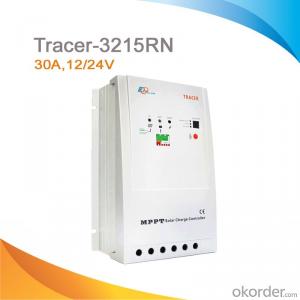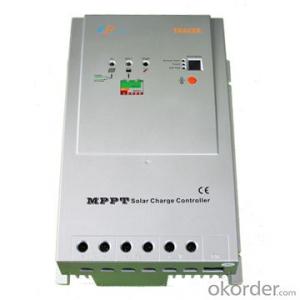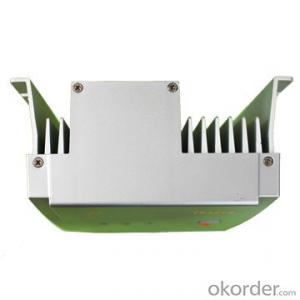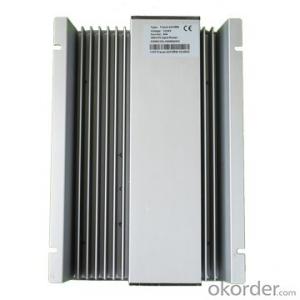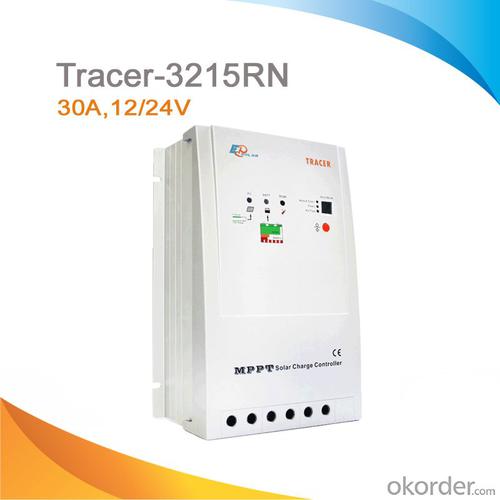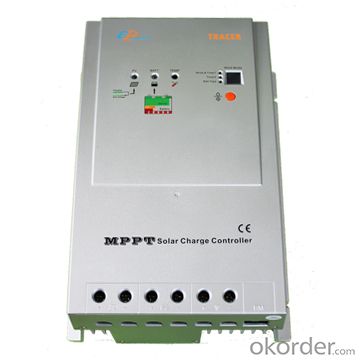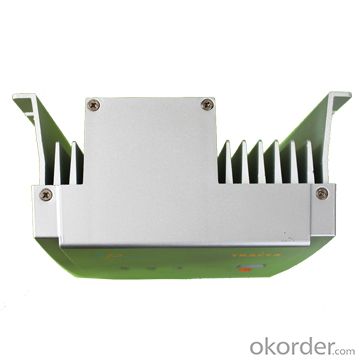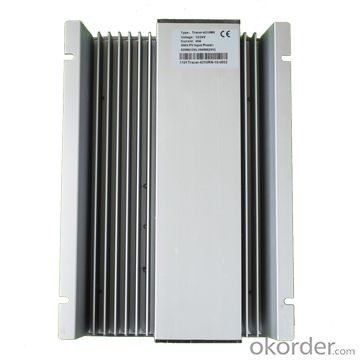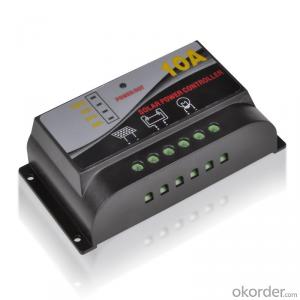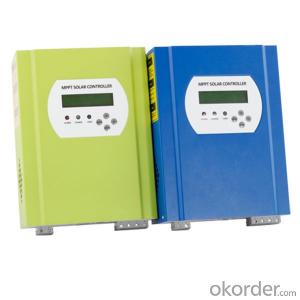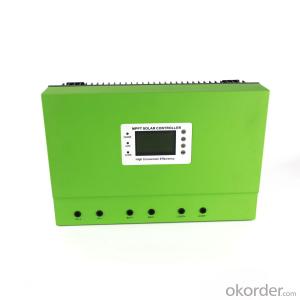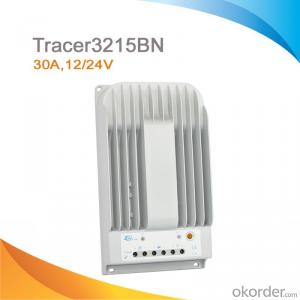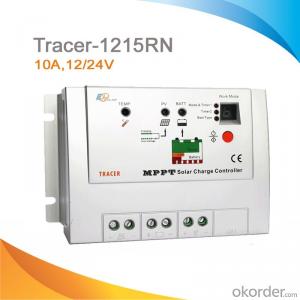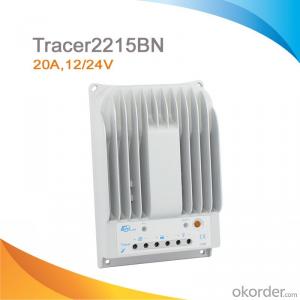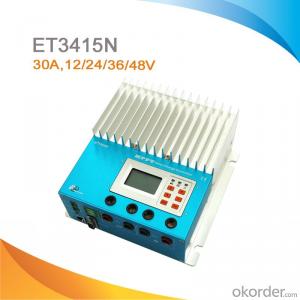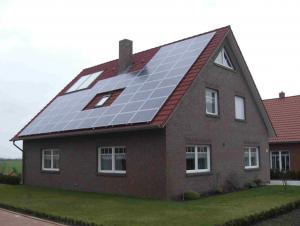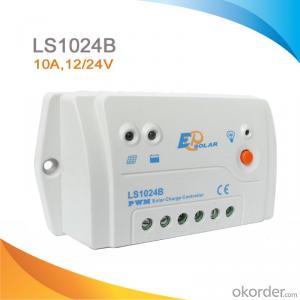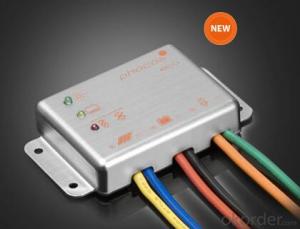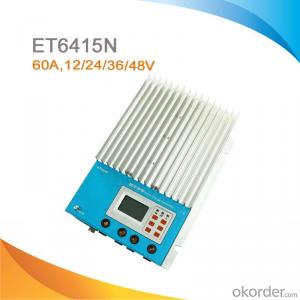Renogy Solar Controllers MPPT Solar Charge Controller for Photovoltaic System 30A, 12/24V Tracer-3215RN
OKorder Service Pledge
OKorder Financial Service
You Might Also Like
Descriptions:
The Charger controller (solar regulator) could store DC generated by solar panels into battery, which could effectively provide living and industrial using electricity in some remote areas and tourism destination areas where have no electric power facilities and electricity network, and have no negative effect on environment.
Specifications
MPPT solar charge controller
Peak Conversion efficiency:97%,
Tracking efficiency:99%
Max. PV input voltage: 100V
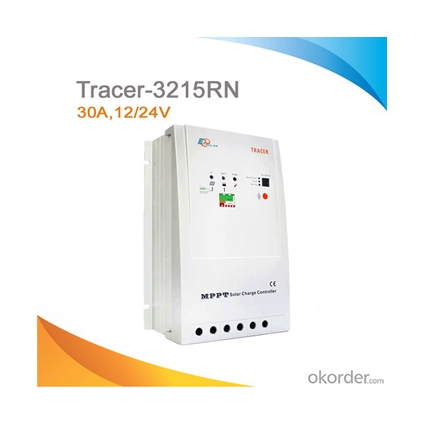
Features:
·MPPT technology
·Peak conversion efficiency of 97%
·High Tracking efficiency of 99%
·Several seconds tracking speed
·4-Stage charge with PWM output
·Nature convection cooling
·Full power output in ambient temperature up to 45 ℃
·Temperature compensation
·Sealed, Gel and Flooded battery option
·Widely used, automatically recognize day/night
·Diversified load control
·RJ45 interface &optional meter
·2 years warranty
·CE certificate
Electronic Protections:
·PV short circuit protection
·PV reverse polarity protection
·PV overvoltage alarm protection
·PV over current protection
·Battery overcharge protection
·Battery over discharge protection
·Battery reverse polarity protection
·Load short circuit protection
·Load overload protection
Specification:
Model | Tracer-3215RN |
Rated system voltage | 12/24V auto work |
Rated battery current | 30A |
Rated load current | 20A |
Max.battery voltage | 32V |
Max.PV open circuit voltage | 150VDC |
Max.PV input power | 12V 390W, 24V 780W |
Self-consumption | <10mA(24V) |
Charge Circuit Voltage Drop | ≤0.26V |
Discharge Circuit Voltage Drop | ≤0.15V |
Communication | TTL232 / 8 pin RJ45 |
Temp.compensation | -5mV/℃/2V |
Working temperature | -35℃~+55℃ |
Storage temperature range | -35℃~+80℃ |
Humidity | 10%-90% NC |
Enclosure | IP30 |
Altitude | ≤3000m |
Dimension | 242mm x 169mm x 91mm |
Mounting holes | 180mm x 160mm |
Mounting hole size | Φ5 |
Terminal | 25mm2 |
Weight | 2kg |
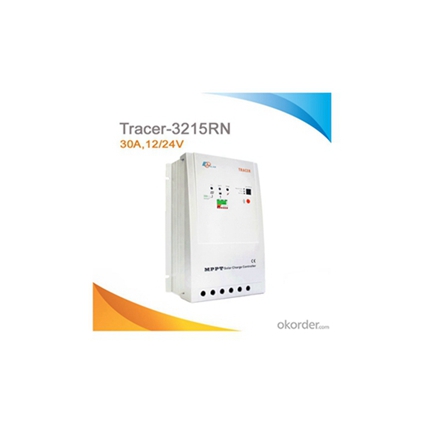
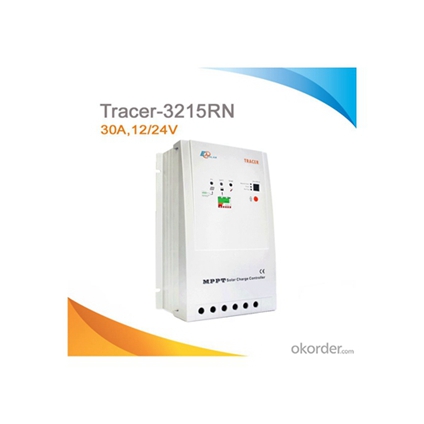
FAQ
1.. What is included in the package?
1*MPPT Solar Charge Controller
1*User Manual
2. What does the battery red indicator LED mean?
Low voltage of battery
- Q: What is the purpose of the battery voltage regulation feature on a solar controller?
- The purpose of the battery voltage regulation feature on a solar controller is to ensure that the batteries connected to the solar system are charged and maintained at an optimal voltage level. Solar panels generate electricity from the sun, which is typically converted into DC (direct current) electricity. This DC electricity is then stored in batteries for later use, especially during periods of low sunlight or at night when the solar panels are not generating power. However, it is important to regulate the voltage of the batteries to prevent overcharging and undercharging, which can significantly shorten their lifespan and reduce their overall efficiency. The battery voltage regulation feature monitors the voltage level of the batteries and adjusts the charging process accordingly. When the batteries reach their maximum charge level, the solar controller will stop or reduce the charging current to prevent overcharging. Similarly, if the battery voltage drops below a certain threshold, the solar controller will increase the charging current to recharge the batteries and prevent undercharging. By maintaining the batteries at an optimal voltage level, the battery voltage regulation feature helps prolong their lifespan, improve their performance, and ensure a reliable power supply from the solar system. It also helps to protect the overall integrity of the solar system by preventing potential damage to the batteries or other connected components due to improper charging.
- Q: Can a solar controller be used with solar-powered indoor waste management facilities?
- Yes, a solar controller can be used with solar-powered indoor waste management facilities. A solar controller is an essential component of a solar power system, as it regulates the flow of electricity from the solar panels to the batteries. It ensures that the batteries are charged properly and protects them from overcharging or discharging. In the case of solar-powered indoor waste management facilities, the solar controller would be connected to the solar panels installed on the facility's roof or surrounding areas. The solar panels would capture sunlight and convert it into electricity, which would then be stored in batteries for later use. The solar controller would monitor the charging process and prevent any damage to the batteries by maintaining a proper charging voltage. It would regulate the flow of electricity from the solar panels, ensuring that the batteries are charged efficiently and effectively. This would maximize the utilization of solar power and minimize reliance on grid electricity. Using a solar controller in such facilities would not only reduce their carbon footprint but also help in reducing operational costs by utilizing renewable energy sources. It would also provide a reliable and sustainable power supply, even in areas with unreliable grid electricity. Therefore, a solar controller is a crucial component in solar-powered waste management facilities, allowing them to harness the power of the sun and operate efficiently while being environmentally friendly.
- Q: What is the maximum solar panel capacity that a solar controller can handle?
- The maximum solar panel capacity that a solar controller can handle depends on the specific model and its specifications. Generally, solar controllers are designed to handle a certain maximum current, typically expressed in amps. So, the maximum solar panel capacity that a solar controller can handle would be determined by the maximum current rating of the controller.
- Q: Can a solar controller be used with solar panel carports?
- Yes, a solar controller can be used with solar panel carports. A solar controller is an essential component of a solar power system as it regulates the voltage and current from the solar panels to ensure efficient charging of batteries or powering of electrical loads. In the case of solar panel carports, a solar controller would be necessary to manage the energy production and distribution, maximizing the utilization of solar power and ensuring the longevity of the batteries used to store excess energy.
- Q: Are there any safety features in solar controllers?
- Yes, there are several safety features in solar controllers. Some common safety features include overcharge protection, over-discharge protection, short-circuit protection, reverse polarity protection, and temperature compensation. These features ensure the safe and efficient operation of solar controllers and help protect the connected batteries and solar panels from damage.
- Q: Can a solar controller be used with solar-powered indoor waste recycling systems?
- Yes, a solar controller can be used with solar-powered indoor waste recycling systems. A solar controller is a device that regulates and manages the flow of electricity from solar panels to batteries, ensuring optimal charging and preventing overcharging or damage to the batteries. In the case of indoor waste recycling systems powered by solar energy, a solar controller is necessary to ensure that the solar panels are efficiently charging the batteries that power the system. This allows for continuous operation of the waste recycling system even in low-light or cloudy conditions. Thus, a solar controller is an essential component in maintaining the functionality and efficiency of solar-powered indoor waste recycling systems.
- Q: Can a solar controller be used with a solar grid-tied system?
- No, a solar controller is not necessary for a solar grid-tied system. In a grid-tied system, the solar panels are connected directly to the utility grid, and the power output is regulated by the grid-tie inverter. A solar controller is typically used in off-grid systems to regulate the charge and discharge of batteries, which are not present in a grid-tied system.
- Q: Can a solar controller be used with solar-powered indoor heating systems?
- Yes, a solar controller can be used with solar-powered indoor heating systems. The solar controller helps regulate and optimize the flow of solar energy to the heating system, ensuring efficient operation and maximizing energy usage.
- Q: How does a solar controller prevent damage from power surges?
- A solar controller prevents damage from power surges by regulating and monitoring the incoming solar power to ensure it stays within safe voltage levels. In case of a power surge, the controller redirects the excess energy and diverts it away from the connected devices or batteries, thus protecting them from potential damage.
- Q: How does a solar controller handle battery over-temperature protection?
- A solar controller handles battery over-temperature protection by continuously monitoring the temperature of the battery. When the temperature exceeds a safe threshold, the controller automatically reduces or completely cuts off the charging current to prevent the battery from overheating. This helps to protect the battery from damage and prolong its lifespan.
Send your message to us
Renogy Solar Controllers MPPT Solar Charge Controller for Photovoltaic System 30A, 12/24V Tracer-3215RN
OKorder Service Pledge
OKorder Financial Service
Similar products
Hot products
Hot Searches
Related keywords
